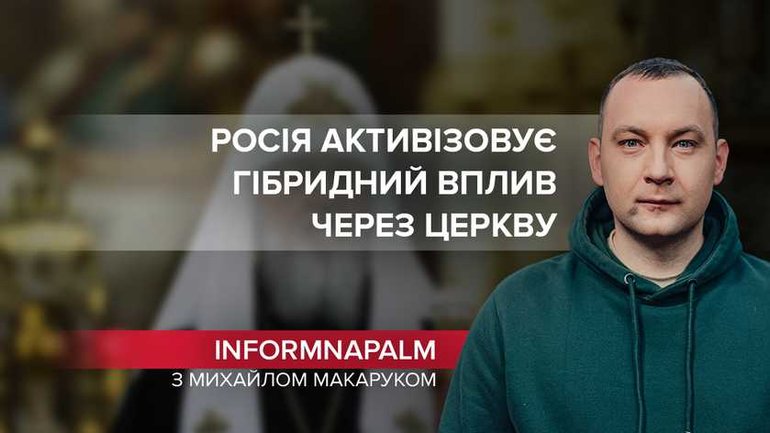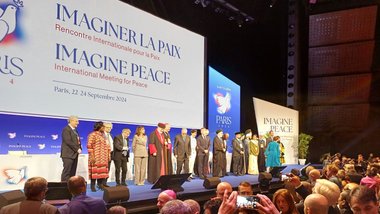Kremlin activates hybrid influence through the Church - InformNapalm volunteer community

Archbishop Yevstratiy (Zorya) of the Orthodox Church of Ukraine drew attention to the recent active working trips of archpriest Nikolai Balashov, deputy head of the Department for External Church Relations of the Russian Orthodox Church, on the Route Belgrade (Serbia) – Banja Luka (Bosnia and Herzegovina)-Zagreb (Croatia).
"The route was not accidentally superimposed on the intensification of the escalation of events in the Balkans. Since Soviet times, the Kremlin has used this Department of the Russian Orthodox Church to cover up agent and intelligence work abroad.
Also, in addition to the Balkans, the Russians continued to work "soft power" in Poland. A delegation of the Russian Foundation for support of Christian culture and heritage visited the Bialystok-Gdansk Diocese of the Polish Orthodox Church on December 11, 2021.
According to informed sources, the Russians allegedly gave Polish religious figures a large "donation" of millions of euros.
Indirectly, the fact of the "donation" was confirmed in his comments by the chairman of this Russian Foundation, Yegor Skopenko, who headed the delegation. He stated that "he is engaged in such charity work in other local churches," the InformNapalm story says.
The International Volunteer Community InformNapalm has already published a series of studies FrolovLeaks, in which it exposed the methods of hybrid Russian influence through church institutions, foundations, church figures and people close to the Russian Orthodox Church.
Also, thanks to data from activists of the "Ukrainian Cyber Alliance", it was possible to reveal that customers from Russia were behind the preparation of some anti-Ukrainian provocations and actions in Poland.
We are talking about Yegor Skopenko, who at the end of 2020 began managing the fund for the support of Christian culture and heritage.
According to the program, This fund was created by the state corporation Rosatom in 2019. It has an extensive structure and can be used by the Kremlin for hybrid influence, lobbying and covering up Russian financial transactions abroad.
The website states that the fund's projects are being implemented in 15 countries, including Bulgaria, Georgia, Turkey, Finland, the USA, Spain, Sweden, Bosnia and Herzegovina, Israel, France, Syria, Poland, Lebanon, Iceland and Russia.
InformNapalm researchers believe that the newly created Foundation is a project to cover up the work of Russian special services through religious institutions in different parts of the world and lobby for Russian interests through significant targeted financial injections. The curators of the above–mentioned Foundation are Alexey Likhachev, a Russian statesman, general director of Rosatom, and Sergey Obozov, who is his deputy.
It was Alexey Likhachev, Sergey Obozov and Yegor Skopenko who met with Moscow Patriarch Kirill in Moscow on November 30, 2021, where they probably received instructions for further pilgrimage to the Balkans and promoting Russian interests.
As stated in the story, thanks to the cover-up of Russian diplomats, it was possible to smuggle a significant amount of cash for "donations" that were actively distributed during the tour without customs clearance.
Mykhailo Makaruk notes that there are many areas in which Russia exercises hybrid influence to destabilize the situation in different countries of the world. These are informational, economic, political, military, terrorist and other means.
"The Russian Orthodox Church remains one of the pillars of the Kremlin, which provides additional opportunities for easy infiltration of the agents of influence abroad.
Its leaders are often referred to as" saboteurs in cassocks "or" priests in uniform " for numerous testimonies of close cooperation of this religious structure with the Soviet - and after the collapse of the USSR – Russian special services.
State corporations and officials work closely with religious institutions to promote the interests of the Russian World."
All data mentioned in the event plot was obtained during the monitoring of open sources of information. The authors of the program note that all this requires intelligence and additional attention from law enforcement and security agencies of both the European Union and other states interested in preventing the destabilization of the situation in the Balkans.
"So far, we have no evidence that for the next generous "donations" to foreign churches, the Russian delegation asked the "clergy" to facilitate the Kremlin's hybrid operations in the Balkans and Poland, but such risks exist. Moscow has repeatedly tested such hybrid instruments of bribery both in preparation for aggression against Ukraine and in other states. Therefore, it is necessary to study such actions with special attention," the InformNapalm International Volunteer Community notes.









